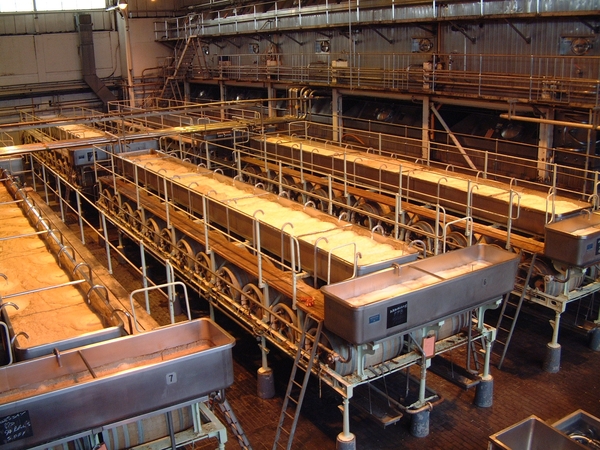Burton 'beast' is brewing in Bakewell
Added: Thursday, June 27th 2024

The Burton Union, a historic system of beer-making that was due to be scrapped, has been saved and is making IPA at the Thornbridge Brewery in Bakewell, Derbyshire.
The saviour is Garrett Oliver, the renowned brew master at Brooklyn Brewery in New York City. He’s a regular visitor to Britain, he’s seen the Unions in operation at Marston’s and he’s made collaborative beers at Thornbridge.
In 2002 Marston’s in Burton merged with global giant Carlsberg to form the Carlsberg Marston’s Brewing Company. In January this year CMBC announced it was closing the Union Rooms on the grounds of cost.
“I was on holiday in Mexico when I heard the Unions were going silent and were heading for the bone yard,” Garrett says. “I didn’t want them to be lost.
“Thornbridge has respect for history, the drive for excellence, the scientific background and the general wherewithal to pull this off so I put to them the idea of acquiring a Union set.”
Burton Unions date from the mid-19th century and were designed to cleanse beer of yeast in order to produce sparkling pale ale. Fermentation takes place in large oak casks linked together or “held in union”. The force of fermentation drives beer and yeast up swan-necked pipes into trays above. The trays are held at a slight incline allowing beer to run back into the casks while yeast is retained.
The system was in widespread use in Burton and other towns in the 19th and early 20th centuries. But it’s labour intensive and by the 21st century only Marston’s was using it to make Pedigree Bitter.
Carlsberg distributes Brooklyn beers worldwide and when Garrett Oliver heard the Unions were to be scrapped he used his contacts to speak to Emma Gilleland, Marston’s Director of Brewing in Burton.
“I urged her to donate a Union set to Thornbridge,” he says.” The story could not have had a happier ending. Emma spoke with Simon Webster and his team at Thornbridge and they were off to the races.”
Simon is the co-founder and chief executive at Thornbridge and he was keen to install a Union set and brew his multi-award winning Jaipur IPA with it.
Emma Gilleland came to Thornbridge with a team of brewers and coopers and they helped set up the Union. They also advised Rob Lovatt, head brewer at Thornbridge, and his team on how to look after the oak casks, which date from 1990, and soak them with clean water on a regular basis.
On 20 May, a batch of Jaipur was made using the Union set. It was in the system for four days and then was racked into casks in preparation for delivery to pubs.
Samples of Jaipur show that the Union-brewed beer is softer, rounder and less bitter than the conventional brew.
Rob Lovatt says he uses the Thornbridge yeast culture in the Union and he adds sulphates to the Bakewell town water to replicate the Trent Valley water found in Burton that’s rich in calcium and magnesium.
Most Jaipur will be brewed in conventional vessels. The Union will be used primarily to produce a new beer, Union IPA, which will be 6 per cent on draught and 7 per cent in bottle.
Rob Lovatt’s recipe is made up of Maris Otter pale malt, Munich and crystal malts and invert sugar. The hops are Goldings and Northdown.
The 7 per cent version will be bottle conditioned. “We’re proud of our bottle-conditioned beers,” Simon Webster says. “And Union IPA will meet a huge market for people who miss White Shield." Worthington’s White Shield was a legendary Burton IPA that was owned by Molson Coors following the exit from brewing by Bass in 2000. Last year Molson Coors stopped producing the beer but it’s not prepared to sell the brand to another brewer.
The Union set at Thornbridge will also be used to make collaborative beers and Simon Webster and Rob Lovatt are already in discussion with interested American brewers.
Garrett Oliver has been to Thornbridge to see the Union in place. “It’s a beautiful beast and it also makes a particularly nice Jaipur,” he says.
Burton Unions: the back story
Peter Walker, a brewer in Warrington, opened a new brewery in Burton in the mid-19th century to use the mineral-rich spring waters of the Trent Valley to produce the new style of pale ale. He was responding to a clamour for clear beer as pewter tankards were replaced by glass in pubs and drinkers were unimpressed by murky, yeasty beer.
In 1837 Walker took out a patent on a new system of brewing that used oak casks connected to swan-neck pipes and troughs.
Within a few years, other breweries in Burton had adopted the Walker system. It spread not only to other centres in Britain but as far afield as Ireland, India and Australia.
Each cask in a Union set holds 150 gallons of beer. Sufficient yeast is left in the beer to allow a powerful secondary fermentation in casks when they reach pub cellars.
The system was expensive to maintain as the oak casks had to be cleaned regularly and repaired by coopers. Ind Coope stopped using Unions in 1959 and in 1982, Bass, the biggest brewer in Burton, closed its Union rooms.
Marston’s was the only brewery in Britain to still use the system until CMBC closed the unions this year.
•Tom Dawson, a retired head brewer at Bass, tells the story of a Japanese visitor who asked: “Do you have any problems with your unions?” He was told: “No, we take the heads off and scrape them out twice a year.” This puzzled the visitor who was enquiring about trade unions.
First published in What's Brewing July 2024. This is a revised version.






